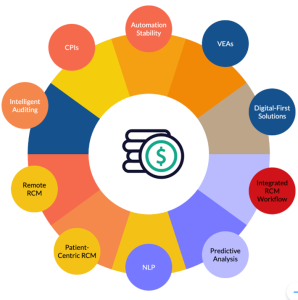With Change being the only constant, every industry is prone to adopt or succumb to the updated practices of the age. The current Tech vocabulary that is trending in marketing is “Automation”. With AI on the Rise almost on par with the Intelligence of a Human Brain, every sector is looking for means to automate and cut costs. Our sector, Healthcare with accuracy and efficiency being the main agenda, is it trying to do the same? Or, how much of the processes can be automated or be influenced by the newer technologies?
Let us weigh and predict the trends that are evolving in the essential processes like Billing, Coding, etc…and obtain clarity on the landscape of the sector in 2024.

In the realm of healthcare revenue cycle management, automation has long been a staple. While the advent of artificial intelligence has led some to speculate the obsolescence of traditional automation methods, industry experts believe otherwise for 2024. They anticipate continued reliance on simple automation due to its effectiveness and cost-efficiency compared to AI. Examples of such automation include automated claims scrubbing, payment posting, eligibility verification, estimation calculation, and EHR integration.
The healthcare industry is witnessing a burgeoning trend in the utilization of virtual employee assistants (VEAs). Market reports project a substantial growth rate of 34.7% for the VEA market between 2023 and 2024. VEAs are being integrated into healthcare revenue cycle management services for various tasks such as appointment scheduling, eligibility verification, claims management, patient outreach, and support. The implementation of chatbots and virtual assistants ensures round-the-clock access to a support desk for patients, streamlining RCM processes. However, for optimal functionality, the RCM team must ensure timely and accurate input of information to enable VEAs to provide real-time updates on claim statuses and billing information.
Digital-first solutions prioritize digital processes in healthcare revenue cycle management (RCM). Despite the industry’s reputation for being slow to adapt, a Becker Hospital review in 2023 revealed that over 90% of healthcare organizations in the United States have embraced digital tools to some degree. In 2024, this trend will continue to gain momentum in the RCM service industry. Processes such as online registration, EHR integration, electronic claims submission, billing integration, and enhancing patient experience will increasingly shift towards digital platforms. This shift not only reduces the workload for revenue cycle management service providers but also allows them to focus on strategic processes that positively impact their clients’ financial outcomes.
Integrated revenue cycle management (RCM) service workflow entails a cohesive system where each step seamlessly connects and coordinates with others, ensuring smooth operations from appointment scheduling to denial management.
In 2024, integrated RCM workflow will be a notable trend for several reasons:
Predictive analysis, utilizing machine learning techniques, is an advanced analytics technology aimed at forecasting future outcomes. In the realm of revenue cycle management (RCM), it enables providers to anticipate patient payment behavior, identify claim denial trends, and forecast future reimbursement patterns to enhance financial stability.
In 2024, predictive analysis is expected to become widespread, with service providers leveraging this technology to deliver impactful revenue management solutions to their clients.
Natural Language Processing (NLP) is a significant component of Artificial Intelligence that facilitates machines in comprehending, interpreting, and responding to human language accurately. In the context of healthcare, one key application of NLP in 2024 is to enhance clinical documentation.
In recent years, incomplete or incorrect documentation has consistently ranked among the top reasons for claim denials. Issues such as inaccurate patient data or inadequate demographic coverage can swiftly result in claim rejections, impacting revenue generation.
NLP technology offers solutions to streamline documentation processes for revenue cycle management (RCM) service providers by:
Automatically extracting crucial information from medical notes and converting them into usable claims.
Identifying patterns related to documentation errors and automatically rectifying them to prevent denials.
Playing a pivotal role in Clinical Documentation Improvement (CDI) by detecting inconsistencies, missing information, and gaps in documentation.
In 2024, patient experience continues to be a focal point within the healthcare industry. Recognizing the significant impact of patient-centric revenue cycle management (RCM) on both patient satisfaction and revenue generation, providers are doubling down on improving this aspect.
To leverage patient-centric RCM as a strategic advantage, providers are implementing various approaches:
Remote revenue cycle management (RCM) involves the seamless integration of telehealth services into existing workflows to facilitate hassle-free reimbursements. With the increased adoption of telehealth services by healthcare organizations since the COVID-19 pandemic, it has become a standard offering.
This shift places pressure on RCM service providers to comprehend the intricacies of telehealth and ensure accurate medical billing and claims processing. As telehealth continues to gain traction, it is imperative for the healthcare community to adapt to this trend, as it is expected to become even more prevalent by 2024.
The ninth significant trend in healthcare revenue cycle management (RCM) services is intelligent auditing, utilizing AI and ML tools to analyze patterns and trends. This approach enhances RCM processes, making them more efficient, effective, quantifiable, and accurate. Numerous RCM service providers and third-party vendors offer intelligent auditing services to clients, allowing them to experience the benefits firsthand and evaluate its impact.
The final trend to monitor in healthcare revenue cycle management (RCM) services is Continuous Process Improvement (CPI). In the RCM sector, CPIs are evolving from being optional to becoming mandatory, as clients prioritize providers who demonstrate effective workflow management. Embracing feedback, implementing ongoing micro-level adjustments to RCM workflows, and proactively addressing issues before they escalate into bottlenecks are essential components of CPI experimentation.
Utilizing AI technology and decades of industry experience, Quintessence offers customizable cost structures and a commitment to producing long-lasting results. By offering you a competitive edge, our solutions are designed to increase your revenues. If you let us know what you need for revenue cycle management (RCM) in 2024, we’ll create a plan specifically suited to your requirements.
This will close in 0 seconds